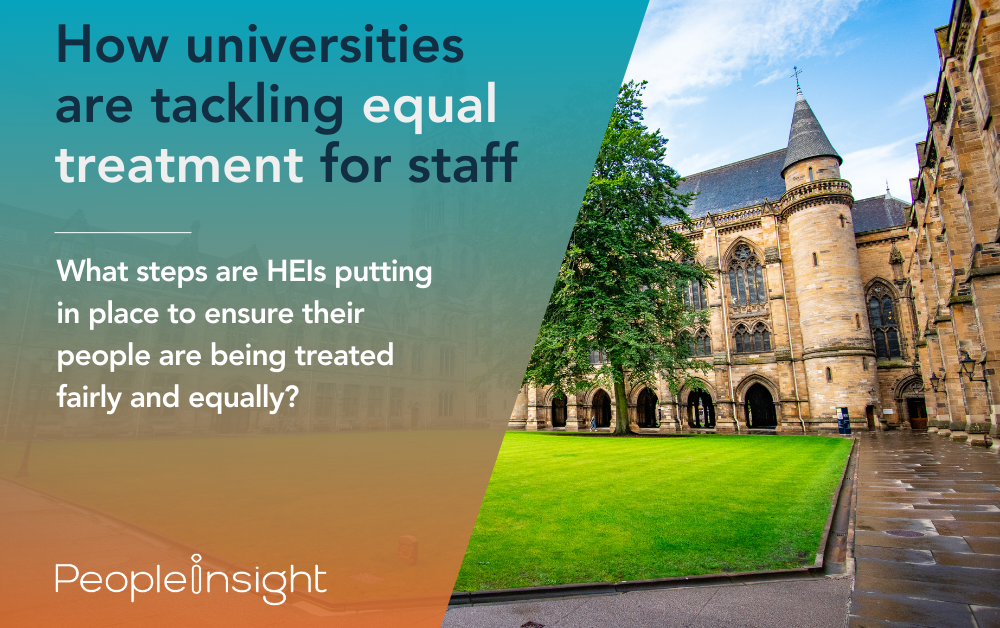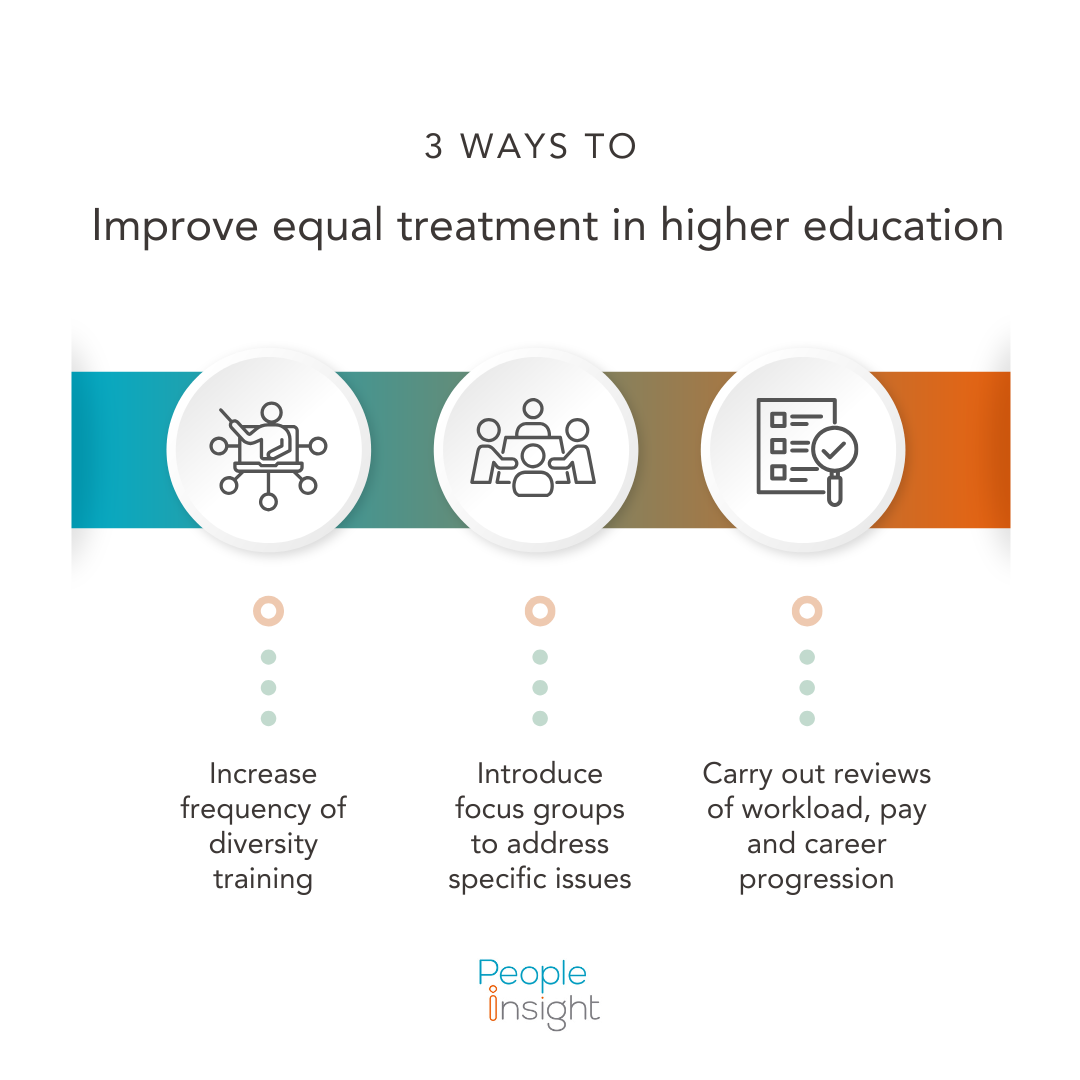
A quick insight: Equal treatment in universities shapes fairness in opportunities, recognition and career progression. When people feel treated fairly, trust and engagement strengthen. Addressing inequities in processes, expectations and support helps build more inclusive academic and professional environments where people feel valued, respected and able to contribute their best.
As with any other sector, creating a workplace where all staff feel respected, valued and treated fairly is a key priority for universities today. Senior leaders want their people to feel heard, included and engaged. But, unfortunately, this is sometimes easier said than done.
Despite significant progress, our benchmark data reveals that disparities persist in how different staff groups perceive fairness within higher education. For example, while 66% of professional services staff believe their institution treats everyone fairly and equally, only 59% of academics share this view.
To bridge this gap and promote equal treatment across the board, universities are adopting targeted strategies that address systemic challenges and support staff wellbeing. We work with 75+ incredible HEIs in the UK and beyond, and we’ve helped them tackle this area — below are just a few ways in which universities are taking strides to improve equal treatment in the workplace. But first, let’s take a quick look at why equal treatment is so important in the first place.
Related: What’s the difference between equality, diversity and inclusion?
Fair and equal treatment is the foundation to building trust and loyalty within any workplace. Employees who perceive their workplace as fair are more likely to feel engaged, motivated and committed to their roles — what’s more, they’re more likely to stick around for longer. When fairness is prioritised, it reduces feelings of alienation, resentment and burnout — issues that can lead to high turnover and reduced productivity.
In higher education, where professional services staff and academic staff often have differing perceptions of fairness (amongst other things), prioritising equal treatment becomes even more significant. According to our benchmark data, 62% of higher education employees feel their institutions treat everyone fairly and equally. However, this number drops to 59% among academics, highlighting an area that needs attention. Discrepancies like these can, in the long run, really erode morale and ultimately impact the quality of education provided.
When universities actively address perceived inequities, employees feel their voices are heard, and their contributions are recognised. This sense of fairness promotes psychological safety — a central factor in building levels of innovation, teamwork and productivity. Institutions that prioritise equal treatment not only create better workplaces but also strengthen their reputation as inclusive and supportive employers.
So let’s get down to practical methods for improvement. Below are three key steps you can put in place to improve equality within your HEI, based on tried-and-tested methods from our university clients.

One significant step universities have implemented is increasing the frequency of diversity training. These sessions help to build awareness and understanding of different perspectives, helping to build a culture of inclusivity. By regularly educating staff on unconscious bias and the value of diversity, universities can address underlying attitudes that may inadvertently contribute to unequal treatment.
Focus groups are another effective strategy that universities are employing in this area. These sessions provide a structured forum for employees to share their concerns and experiences, particularly around perceived unfair treatment. The feedback collected in these discussions allows higher education institutions to identify and address specific issues impacting staff wellbeing.
Universities that actively involve employees in focus groups demonstrate a commitment to transparency and collaboration. This approach not only empowers staff but also helps build trust in higher education leadership. By acting on the insights gained, universities can address concerns before they escalate, creating a more harmonious work environment.
Related: The Race Equality Charter & employee voice: How to enact change
Systematic reviews of workload, pay and career progression pathways are key to promoting equal treatment. These reviews help institutions uncover disparities that may exist within their organisational structures and provide a foundation for meaningful change.
For example, disparities in workload allocation can lead to dissatisfaction among academics, while unequal pay scales may contribute to resentment among professional services staff. Addressing these issues is not only a matter of fairness but also impacts the institution’s ability to attract and retain top talent. By promoting equal opportunities for advancement and fair compensation, universities can demonstrate their commitment to treating all employees with respect and equity.
These steps universities are taking to improve equal treatment for staff are essential for creating a fair and inclusive environment. These efforts directly contribute to greater engagement and motivation among employees, driving better outcomes for institutions and their communities.
Our benchmark data shows the progress made across the sector, but it also highlights the work that remains to be done. Universities need to continue to address discrepancies in perceptions of fairness between professional services staff and academics.
If your institution is looking to enhance employee experience and promote fairness, a higher education staff survey can provide valuable insights. Contact us today to learn how our surveys can help you identify areas for improvement and take actionable steps towards a more inclusive workplace.
Together, we can create a stronger, more equitable higher education sector. Get in touch now to discuss your higher education staff survey — start building a workplace where fairness and inclusivity thrive.
More in the HE actions series:
12 Ways unis are improving wellbeing in higher education
10 ways HEIs are proactively addressing reward and recognition
5 ways HEIs are actively improving their physical work environment
How HEIs are improving communication at work
How HEIs are creating a sense of purpose at work
7 Steps universities are taking to improve training & development
